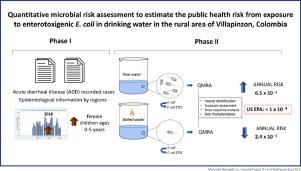Microbial Risk Analysis ( IF 2.8 ) Pub Date : 2021-05-09 , DOI: 10.1016/j.mran.2021.100173 J.L. Moncada Barragán , Lucumí D.I. Cuesta , M.S. Rodriguez Susa

|
The consumption of contaminated water is a major cause of acute diarrheal disease (ADD), particularly in rural areas where treatment and control are limited. The aim of this study was to characterize the epidemiological situation and microbiological risk linked to water consumption in the rural area near the capital of Colombia. A cross-sectional study was carried out using secondary data analysis about water quality records and survey information. We described the epidemiological situation of ADD in the municipality and we estimated the risk of ADD by enterotoxigenic E. coli (ETEC) from drinking water in that region using Quantitative Microbial Risk Assessment (QMRA). During the study period, 1318 cases of ADD were reported, with 33% in children under 5. For all zones evaluated the risk exceeds commonly used acceptable risk levels. Inadequate protocols for thermal treatment and subsequent storage increase the risk of illness. The study highlights the need to strengthen intersectoral work, improve water infrastructure, and implement protocols and education about the management of drinking water to reduce health risks.
中文翻译:

哥伦比亚维拉平松农村地区饮用水中暴露于产肠毒素大肠杆菌的公共卫生风险的定量微生物风险评估
饮用受污染的水是急性腹泻病 (ADD) 的主要原因,尤其是在治疗和控制有限的农村地区。本研究的目的是描述哥伦比亚首都附近农村地区与用水相关的流行病学情况和微生物风险。使用关于水质记录和调查信息的二次数据分析进行了横断面研究。我们描述了该市 ADD 的流行病学情况,并估计了产肠毒素大肠杆菌引起 ADD 的风险(ETEC) 从该地区的饮用水中使用定量微生物风险评估 (QMRA)。在研究期间,报告了 1318 例 ADD,其中 33% 为 5 岁以下儿童。对于所有评估的区域,风险都超过了常用的可接受风险水平。不适当的热处理和随后的储存方案会增加患病的风险。该研究强调需要加强跨部门工作,改善水基础设施,并实施有关饮用水管理的协议和教育,以减少健康风险。



























 京公网安备 11010802027423号
京公网安备 11010802027423号